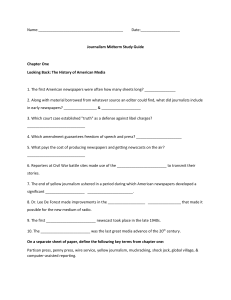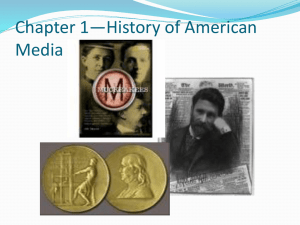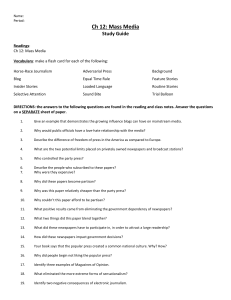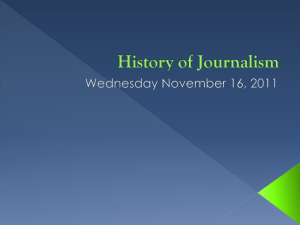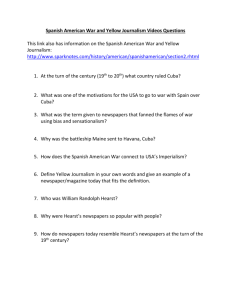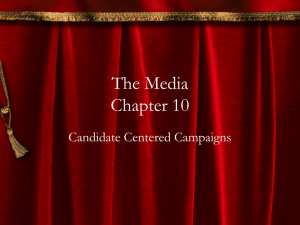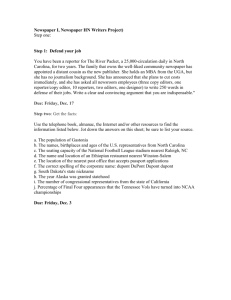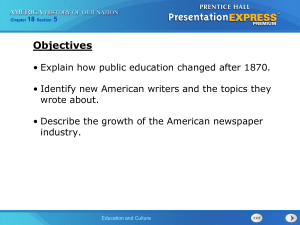Reporting 101 - School of Journalism
advertisement
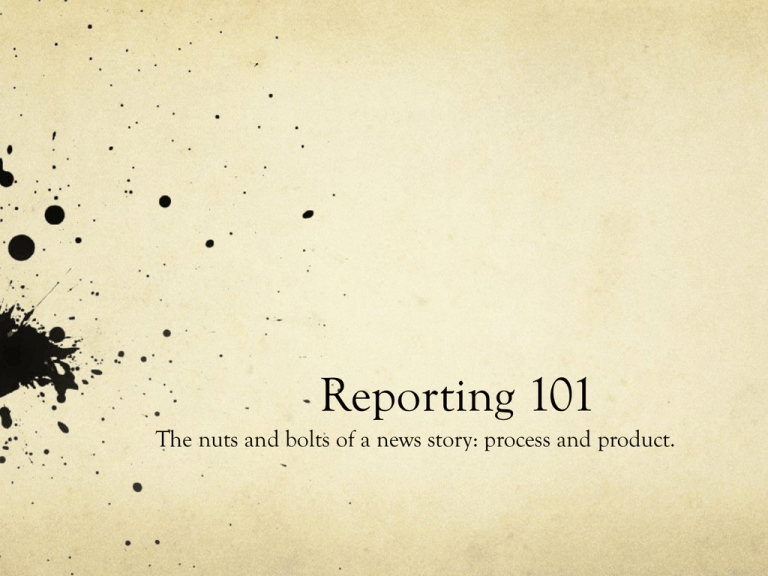
Reporting 101 The nuts and bolts of a news story: process and product. Why Journalism “Were it left to me to decide whether we should have a government without newspapers, or newspapers without a government, I should not hesitate a moment to prefer the latter.” ---Thomas Jefferson “I still believe that if your aim is to change the world, journalism is a more immediate short-term weapon.” ---Tom Stoppard “Put it before them briefly so they will read it, clearly so they will appreciate it, picturesquely so they will remember it and, above all, accurately so they will be guided by its light.” ---Joseph Pulitzer Writing- not easy “There's nothing to writing. All you do is sit down at a typewriter and open a vein.” - Walter Wellesley "Red" Smith “Easy reading is damn hard writing.” – Nathaniel Hawthorne “The role of a writer is not to say what we all can say, but what we are unable to say.” - Anaïs Nin Reporting-definitely not easy It’s in the preparation– in those dreary pedestrian virtues they taught you in seventh grade and you didn’t believe. It’s making the extra call and caring a lot. Diane Sawyer If you’re a reporter, the easiest thing in the world is to get a story. The hardest thing is to verify. The old sins were about getting something wrong, that was a cardinal sin. The new sin is to be boring. David Halberstam The dream begins with a teacher who believes in you, who tugs and pushes and leads you to the next plateau, sometimes poking you with a sharp stick called "truth”. Dan Rather What is reporting then? Getting the best obtainable version of the truth within the given time constraints Trying to be as non-partisan as possible Highlighting stories and issues that are important to the community being served Providing accurate, interesting, significant and relevant information through constant verification Starting point for pleasant and unpleasant conversations What makes a good story? A good focus- what’s the point? How does it inform people? When, where, why and how. I would like to add a new W- where from? What is the source of your story? Is it about a topic you want to read? How will writing about it affect your readers? Tips from an expert: Scott Simon of NPR: How to tell a story Qualities of a good reporter Innate curiosity Ample skepticism yet childlike excitement and enthusiasm Desire to build intellectual capital A thick skin-- you will always LOSE the popularity contest. Passion for the work Willingness to pursue shoe leather journalism as emphasized by Pulitzer prize winner Anne Hull Different kinds of stories News- what’s happening now/ issues of concern at the moment Features- ongoing issues- usually social, human interest; ones that touch the emotional core Business- community business leaders, shop around the corner? Sports- school sports Opinion- what are students talking about Long form- an 800-word long feature that a student may want to write about News Writing An event that possibly happened a day or two before your paper hits the press or printing machine Inverted pyramid structure- most important part of the story comes first. Eg: any news story Question for class: do you have opportunities for news stories in your school papers? Feature Writing Offers you more creativity- allows you to write an engaging lead rather than bog you down with a straitlaced news sentence. One example. Can comprise long form storytelling/ student profiles/ staff profiles/ an ongoing issue in the school. Other forms include opinion writing- more of writing a critical argument. This is a good example of writing a feature that was published on the weekend based on a news story that was big during the week. You have the idea, what next? Research: Read up on the issue; previous news stories, articles, visit the public library (look up directions on Google!) Online resources- there’s a lot of information out there, make use of it. Talk to people you think are experts on the issue. Narrow the focus- try and explain the story in two to three coherent sentences or come up with a Reporter’s hypothesis/ research question. What next? Create an outline or a blueprint and start filling it in with your notes and quotes you have gathered. Once you’ve filled in all the blanks- rearrange the text so that flows in a logical, coherent way. A process to the writing: Lead- 10% Context- 10% Body- 70% Conclusion- 10% Story must have a beginning, a middle and an end. Sources and Interviews Research the people you talk to. Conduct interviews- preferably face-to-face when time permits. Katie Couric tells you how. Try to get diverse voices in to provide a larger perspective. Be upfront about quoting them. Online sources are becoming the norm but it might be a good idea to have people’s permission to use their quotes. To tape or not to tape interviews? Story ideas- where from? Local newspapers and news channels Random, unscientific poll of students, parents, teachers Looking at other school newspapers to get an idea of how they might have covered a news story You have a group exercise that involves beatswonderful way of building sources and tapping them for story ideas. Finding good topics What are the enduring issues? Universal subjects? Look at before and after the news has occurred – personalize it. Is there someone whose life is similar to that of someone in the headlines? For instance, a star football player in the headlines, what’s the life of other football players in the school? Or someone who wants to make the football team? When can you go in the opposite direction to get an interesting story? An example would be interviewing a poor person in a supposedly prosperous community. Finding good topics Is there an untold background tale? Is an ending really another beginning? Writing about a few alumni a year after they graduated. How is college life treating them? Did they get scholarships? Chip Scanlon from Poynter.org on storytelling Question for class: How do you go about finding topics for news stories? What makes a good lead Draw in audiences About 10 percent of your total story length Power of a good lead- some advice as given by Chip Scanlon Sampling of ASNE award-winning leads Building a source base Talking to people- be nice Honoring what you promise them- returning with a copy of the story when published, not quoting something said in confidence. Staying in touch- calling sometimes just to say hi. Being as accessible to them as you expect them to be accessible. Being honest. Some writing rules George Orwell in his essay, “Politics and the English language.” Never use a metaphor, simile or other figure of speech which you are used to seeing in print. Never use a long word where a short one will do. If it is possible to cut a word out, always cut it out. Never use the passive where you can use the active. Never use a foreign phrase, a scientific word or a jargon word if you can think of an everyday English equivalent. Break any of these rules sooner than say anything barbarous. It’s cool to be uncool Commitment to journalism and writing is priority Long hours are norm It’s a lonely job- but you aren’t alone In the end, you will be the uncool person who asks the annoying questions, uncovers the best obtainable version of the truth, writes stories that count and THAT is cool.

